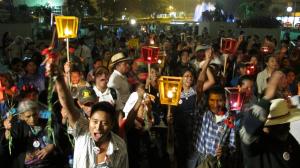Since my post reflecting on the connection between my Jewish identity and the Genocide Trial for Guatemalan dictator Efrain Rios Montt and Maurcio Rodriguez Sanchez, I have not written about the trial.
My reasons for not writing about such a watershed event in Guatemala’s history are complicated. Writing about the trial necessitates a keen understanding of Guatemala’s present-day judicial system and 36-year Civil War. My knowledge of both topics is limited, and I have preferred to listen to the expert analysis of Guatemalan survivors and Human Rights Advocates. Furthermore, the trial’s proceedings have many nuances, and I believe that I could do harm sharing information on such a public forum without cautious knowledge for how what I publish could affect Guatemalan survivors’ pursuit of justice.
In writing about Guatemala, I perceive Guatemalans and Human Rights Advocates as belonging to the inner rungs of a spiral, and I position myself on an outer rung, whereby I aim to reach outward to promote awareness and simultaneously inward to draw support to them. Yet April 18th and 19th brought about such surprising turns to the Genocide Trial that I have decided to briefly share my thoughts, and point readers to excellent sources of information that they can access to learn more about the trial. In addition to the sources linked below, I recommend following the blogs, facebook posts, and twitter feeds of NISGUA (Network in Solidarity with the People of Guatemala) and GHRC (the Guatemala Human Rights Commission) to receive up-to-date information of the trial’s proceedings.
On Thursday, April 18, 2013, Genocide Trial Judge Carol Patricia Flores declared testimonies from genocide survivors invalid, which would suspend the trial, and turn back progress to pre-trial proceedings of November, 2011. According to journalist Allan Nairn, this shocking and confusing decision was politically motivated. Despite this heartbreaking setback, that very night hundreds of Guatemalans, led by a delegation of Ixil Mayan genocide survivors, marched on the Palacio de Justicia, chanting “We are all Ixiles”and held a candle light vigil praying for justice.

Hundreds of people, lead by the Ixil Mayan delegation, chanting “We are all Ixiles”, marched on the Palacio de Justicia, and in a candle light vigil prayed for, demanded justice. (photo courtesy of Laurie Levinger via Facebook Page for “Granito: How to Nail a Dictator,” April 19, 2013)
The next day, Friday, April 19, 2013 brought even more twists and turns. Judge Jazmin Barrios reconvened the Genocide Trial, and the trial’s panel of three judges issued a statement that the trial would continue. However, the trial was temporarily suspended so that the court could resolve the legal issues that had caused Judge Flores to declare the trial illegal the day before.
While following April 19th’s updates on facebook, I was listening to Radio Ambulante, a Spanish-language radio program showcasing compelling human stories from around Latin America and the United States. I was listening to an interview with Guatemalan American writer Francisco Goldman and Dominican American writer Junot Diaz regarding their experiences writing about Latinos in English and their relationships with Latin America.
The interview was incredibly interesting as I am a big fan of Francisco Goldman’s work, and have reviewed “The Art of Political Murder” on my blog. I also wrote my undergraduate thesis on “Drown,” Junot Diaz’s collection of intersecting vignettes about Dominican immigrants. Much of their conversation about language and identity fascinated me, and I plan to dedicate a future post to their interview addressing this topic.
Toward the end of the interview, Goldman shared a perspective that eerily resonated with Guatemala’s genocide trial proceedings. His recently published novel “Say Her Name” is about his wife Aura Estrada, who tragically died in a surfing accident. He stated how he was “plunged into trauma” after her death, and his suffering gave him a newfound understanding of Guatemala “as a space filled with thousands of people who have lost their loved ones in a violent way.”
My reflection on the weight of Goldman’s words gave way to thinking about the waves of suffering Guatemalan genocide survivors feel–not just from the loss of their loved ones, but also from the re-traumatization of sharing their stories in a court room that denied them justice on April 18th. However, their refusal to accept this verdict, truly speaks to incredible abilities to yoke their trauma with resilience. As the trial proceedings continue to unfold, I am uncertain of the future portends save for my commitment to sharing information and expressing solidarity and support for justice in Guatemala.
Learn more about the Genocide Trial of Rios Montt and Maurcio Rodriguez Sanchez
1. The Open Society Justice Initiative. The Trial of Efrian Ríos Montt and Maurcio Rodriguez Sanchez. 2013. http://www.riosmontt-trial.org/ This excellent website, written in English and Spanish, contains detailed updates of trial proceedings written by International Human Rights Monitors, comprehensive historical background information, Glossary, and Timeline.
2. Rodriguez, James. “2013-04-19. On day 21, the Genocide Trial’s fate rests on the Constitutional Court.” MiMundo. http://www.mimundo.org/2013/04/20/2013-04-19-on-day-21-the-genocide-trials-fate-rests-on-the-constitutional-court/ and “2013-04-18. On day 20, the Genocide Trial is Abruptly Cancelled.” http://www.mimundo.org/2013/04/19/2013-04-18-on-day-20-the-genocide-trial-is-abrubtly-cancelled/Photojournalist James Rodriguez’s evocative photoessays document the courtroom on April 18th and 19th.
3. Golman, Amy. “Genocide Trial of Former Dictator Ríos Montt Suspended After Intervention by Guatemalan President.” Democracy Now. April 19, 2013. http://www.democracynow.org/2013/4/19/genocide_trial_of_former_dictator_ros Democracy Now’s interview with journalist Allan Nairn is very helpful in illuminating the reasons that motivated the April 18th trial suspension.
Listen to Francisco Goldman and Junot Diaz on Radio Ambulante
1. Alarcón, Daniel. “Junot y Francisco : En vivo desde Nueva York.” Radio Ambulante. February, 2013. http://radioambulante.org/es/ I thoroughly enjoyed listening to this interview, and look forward to discussing many of the issues the authors discussed in a future post. I also highly recommend listening to Radio Ambulante, which I have compared to This American Life for Latin Americans and Latinos living in the United States.